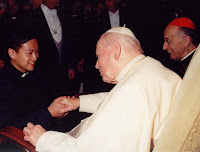 Each year, sandwiched between the feast of two great saints (St. Dominic on August 8 and St. Lawrence on August 10), we celebrate that of a great woman: St. Teresa Benedicta of the Cross—more popularly known in philosophical circles as Edith Stein.
Each year, sandwiched between the feast of two great saints (St. Dominic on August 8 and St. Lawrence on August 10), we celebrate that of a great woman: St. Teresa Benedicta of the Cross—more popularly known in philosophical circles as Edith Stein.Her life had many turning points as it had many facets. Edith Stein was a philosopher, a convert from Judaism, a Carmelite nun, a martyr, and a saint. She was a disciple of the great phenomenologist, Edmund Husserl. So awestruck was I by all this that once I thought of taking her as the philosopher of my choice for my licentiate thesis. Though this thought did not materialize, as I instead wrote on Ernst Bloch. However, my admiration for this philosopher-martyr has never faded. I continue to dream about her deep insights.
Her doctoral dissertation was entitled On the Problem of Empathy. It is a philosophical work and therefore uses categories that are beyond the great majority who have not pursued the vocation to be a philosopher. However, I find it interesting that this was the topic of her choice. Sympathy for a person means feeling with that person. Empathy is much deeper than that: it is feeling in, that is, really experiencing the joy or the sorrow of the other person.
Perhaps it is this thought of empathy that paved the way for the major turning points in her life. Experiencing the rewarding life of a fulfilled philosopher who sought for truth was not enough for her: she sought the Truth who was God himself and thus went deeper—into contemplation—as she entered the walls of Carmel. It was empathy that made her endure the dread of entering the gates of Auschwitz and facing death. In what she preached she was tested and passed with flying colors.
Dear friends, empathy is not an easy thing. To sympathize is hard enough (though it is non-committal); to empathize is even more tedious as it will demands a lot from us. Yet empathy is one more way of going the extra mile, of being convinced that in the sense of living comes with doing things wholeheartedly.

No comments:
Post a Comment